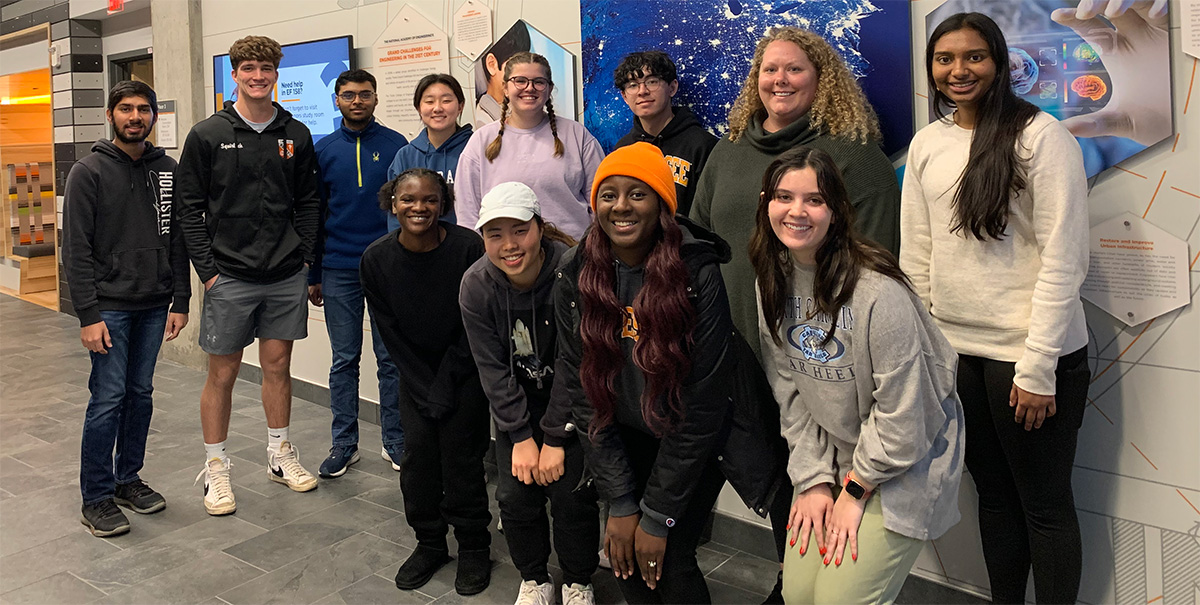Undergraduate Research Program Boosts Opportunities for Students
The University of Tennessee’s Tickle College of Engineering (TCE) and the Office of Undergraduate Research and Fellowships partnered together to better understand the barriers and further define the opportunities associated with engaging students in undergraduate research experiences within TCE.
Undergraduate research is noted as a high-impact practice that engages students in learning areas such as critical thinking, inquiry, information literacy, data collection and analysis, communication, and collaboration skills. Skills and knowledge developed through undergraduate research are beneficial for students seeking job placements in industry directly outside of undergraduate studies and for students seeking graduate studies, sometimes with the very researcher or industry that sponsored their research.
The Cook Grand Challenge Honors Program and the Women in Engineering Program (WiE) within TCE were selected to guide and cultivate the new Undergraduate Research Program, finding great success in recruiting a diverse group of students to participate in the pilot program.
“Our main goals were to provide research opportunities for first-year students, to understand their motivations, and assess their attitudes toward continuing their education by seeking a thesis-based graduate degree,” said Cook Grand Challenge Program Director Kevin Kit. “Sixty-two students applied to join the program and fifteen faculty volunteered to help mentor students. We were fortunate to support eleven students who were matched with faculty mentors based on their interests.”
Cohort-based professional development was provided on a bi-weekly basis with topics such as an introduction to undergraduate research, career readiness, research opportunities beyond UT, and a panel of current undergraduate researchers being utilized to provide students with resources and knowledge that they themselves had gleaned from their own research experiences.
Students can use this experience to potentially secure off-campus research experiences, such as Research Experience for Undergraduates (REU) programs, national lab programs, and other research experiences at UT or beyond as well as to gain value experience related to their major in their first year of college.
“When I was applying for one of the research positions provided by them, they sent me emails and checkups to make sure I was doing OK and if I needed any help on the application, which I appreciated,” said Trinity Bissahoyo, a sophomore majoring in computer science who has been selected to take part in an REU program at Ohio State University over the summer. “Someone from the office also came and talked with my TCE undergraduate research cohort about other research opportunities and how the office can help.”
These sessions were facilitated by the Office of Undergraduate Research, the Center for Career Development and Academic Exploration, and members of the TCE community. Students were also given the opportunity to share the objectives and results of their research with the rest of the cohort by giving presentations at the end of the semester, thereby strengthening the knowledge of participants through shared experiences, which often create stronger memories.
“Hearing about the success of others, how they went about working on their research, what problems they overcame, those are things that don’t just help students form bonds, but it reinforces their own experiences with research,” said WiE Director Jalonda Thompson. “As this program moves forward, there will be times that students who have participated in past or ongoing research opportunities will have a chance to talk to students who are taking part for the first time, almost like a mentor-mentee relationship, even further cementing the experience for them.”
The Exhibition of Undergraduate Research and Creative Achievement (EURēCA), led by Undergraduate Research and Fellowships in the Division of Student Success, was another area for students in the program to shine, with James Jerden, Jahenulie Weste, and Nicole Liu taking part. Liu won a second place prize in research for her project, “Optimized Bifunctional OER and ORR with a Spinel Catalyst” under her mentor, Department of Materials Science and Engineering Assistant Professor Katharine Page. As a sign of the program’s impact, 100 percent of the first cohort completed their projects, with 55 percent of the students saying that they planned to continue doing undergraduate research moving forward.
